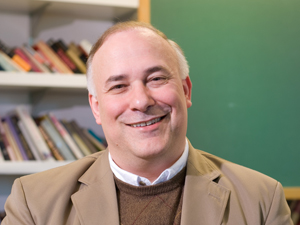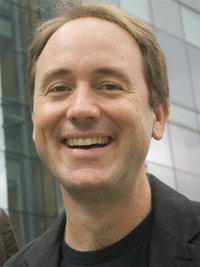Bridging the Gap Between Computer and Social Scientists
By Tiffany Fox, (858) 246-0353, tfox@ucsd.edu
San Diego, CA, Oct. 23, 2008 -- For all its merits as a mecca for research and learning, the campus at UC San Diego has one liability: It's so vast that spontaneous, cross-departmental collaborations don't occur easily, especially between experts in fields as diverse as the computer and social sciences.
|
"The use of computational algorithms has been revolutionary for fields like biology and physics, and is starting to become revolutionary in the behavioral and social sciences," says UCSD Political Science Professor Mathew McCubbins, one of the event's key organizers. "At the same time, there's been a long tradition of studying networks within social science realms like sociology and communications.
"In fact," he continues, "if engineers ignore the fact that computer networks are actually human or social networks, they'll be designing their algorithms incorrectly. The core idea with the BSCS3 series is to invite interesting speakers to campus and provide a venue where people from these different departments get to meet each other and see who is working on similar projects."
First to speak at this year's series was Vijay V. Vazirani, a leading researcher in algorithm design at Georgia Tech's College of Computing. His Oct. 9 seminar, "Nash Bargaining via Flexible Budget Markets," demonstrated how mathematician John Nash's algorithmic game theory could be used to provide solutions for market bargaining where conflicts of interest occur. Streaming video of Vazirani's talk is available in the Calit2 Multimedia archive. [Windows Media and broadband connection required].
Next on the speaker schedule is James Fowler, an associate professor of political science at UCSD. His lecture, which takes place Nov. 12 from 1 to 2:30 p.m. in Calit2's Atkinson Hall, will examine "A Model of Genetic Variation in Human Social Networks."
|
"Using a new approach called the 'Mirror Network' method, I will then show how current models of social networks fail to account for this fact. Finally, I'll provide a simple computational alternative called the 'Attract & Introduce Model' that captures the importance of both nature and nurture in human social networks.
"These results suggest that natural selection might have played a role in the evolution of social networks. They also suggest that modeling both nature and nurture may be important for understanding the way genes affect human behaviors and the way these behaviors spread from person to person to person."
Exploring the role of human behavior in the realm of computing has become a key focus of the BSCS3 organizers, who include faculty from UCSD's Rady School of Management and the departments of Economics, Political Science and Computer Science and Engineering (CSE Professor Mohan Paturi plays a significant role in organizing the series).
"One of the core findings we've come across is that once we start thinking of computing networks as social networks, the structure of the networks becomes very important, especially when there's conflict," McCubbins says. "If a network is highly connected and we're relying on a few core people to solve the problem, then the network starts to fail because we're putting too much complexity on too few people. This means there's a trade-off between local complexity and connectivity, or what we call 'constrained optimization.' Once we start thinking about networks as social networks, the goal of maximum connectivity may not be appropriate anymore.
"See," he jokes, "this is what happens when you get together with a bunch of people from different disciplines!"
One example of a computer-based product that has experienced the consequences of human "interference" is the real-estate pricing Web site Zillow.com. Those associated with BSCS3, along with researchers from UC Berkeley and UC Los Angeles, are examining the social, computational and economic fallout as users become increasingly able to manipulate Zillow's algorithms.
"Zillow uses certain algorithms to take social inputs and provide an outcome, which is something economists and political scientists call 'social choice processes,'" McCubbins explains. "Without any forethought of what the welfare consequences would be, the people at Zillow have been using a simple algorithm that doesn't comport with the social algorithms that real estate agents have always used, which are based on 'location, location, location.' It never occurred to them that people were going to start using the site to replace their real estate agents, or to replace the MLS (Multiple Listing Service), but that's exactly what has happened. This has created a growing mess, because now Zillow appears to be mispricing property, and, as foreclosures become a large fraction of the market, it is not clear that Zillow's algorithm is capable of translating inputs to socially acceptable output and its prices may be off by some gigantic amount.
"Social scientists have theorems that date back four decades telling us these processes can be manipulated, but because there hasn't been an effort to collaborate prior to BSCS3, computer scientists have in the last decade or so discovered these theorems. We know all algorithms can be manipulated; what we would like to do is understand the cost structure for manipulation of each algorithm. We know that lots of companies that are using algorithms that are not expensive to manipulate, and we all have a loss in welfare because of that. US News and World Report's algorithm for ranking colleges and professional schools is so patently manipulable that most schools have committees or staff people whose job it is to manipulate the inputs that US News uses to create its rankings. People find these algorithms on the web and use them blindly without knowing what they really do. The next interesting step will be when lawyers start getting involved with all these algorithms, as these algorithms change prices and create winners and losers."
The solution, McCubbins says, is to derive algorithms that are costly to manipulate substantively, and then encourage companies to use them as a means of avoiding such scenarios. But coming up with these algorithms is a daunting process, he says. "Google has found, to their dismay, that they require a whole division to solve these problems, and their solution is to keep the details secret. Secrecy and power has through human history led to corruption, so one would have to worry about solutions that kept the choice processes, the ranking by Google or the pricing by Zillow, secret."
Representatives from Google were among the first to participate in the BSCS3 seminar series: Google Chief Economist Hal R. Varian gave a lecture during last year's inaugural series on "The Economics of Internet Search. [Click for streaming video of Varian's talk.]
Other speakers have hailed from Harvard University, Stanford University, Caltech, Carnegie Mellon, the University of Pennsylvania and the Max Planck Institute for Human Development in Berlin, Germany. Siddarth Suri, a postdoctoral researcher with Cornell and Yahoo!, will present this year's third lecture: "Strategic Network Formation with Structural Holes, to be held Dec. 11 at 1 p.m.
"The inter-disciplinary, cross-university collaboration that BSCS3 promotes is central to our focus at Calit2," says Ramesh Rao, Director of Calit2's UC San Diego division. "We feel it's of crucial importance to offer a series like this one, where the exchange of ideas can bridge the gap between academia and industry, as well as vastly different — yet innately similar and interconnected — fields of knowledge."
Fowler says he was thrilled when he was asked to participate in the series because he's learned so much from past lectures.
"Past speakers in this series have pushed hard on the boundary between social science and computer science," he remarks. "In addition to being a venue for cutting-edge research, this series gets social scientists and computer scientists in the same room. I have met several people from other departments as a result of attending these lectures, and this has helped me to initiate some cross-disciplinary projects. In this new era of massive/passive data collection, we have the potential to understand large-scale social interactions like never before."
Media Contacts
Tiffany Fox, (858) 246-0353, tfox@ucsd.edu
Related Links
BSCS3



